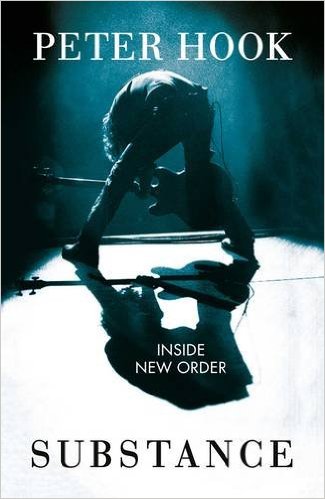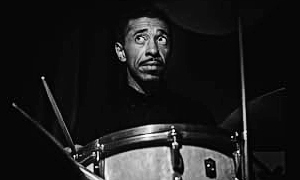Home » Jazz Articles » Book Review » Peter Hook: Substance - Inside New Order
Peter Hook: Substance - Inside New Order
 Substance: Inside New Order
Substance: Inside New Order Peter Hook
768 Pages
ISBN: 1471132404
Simon & Schuster
2016
Evidently, this is the golden age of book memoirs by world renowned music artists as the bookstores are being literary showered by juicy memoirs full of soul-baring, band drama, drugs, debauchery and salacious gossip. The appeal of some of these books is evident and immediate. Most of these artists are fascinating already because of their music and lifestyle. Many of the aforementioned memoirs rarely lived up to the expectations promising more but delivering less. Lately, some of the newly published memoirs are of Tolstoyan size with the writers obviously aiming for the equivalent of the double album in music. Bassist Peter Hook's own memoir about New Order is of a Russian classic's size with its 720 pages, but nevertheless, it is an absorbing, informative, entertaining and educational read.
In recent years, he has written two books each concentrating on different chapters of his illustrious career; a hilarious book about the money sucking investment in the form of the legendary club Hacienda (The Hacienda: How Not to Run a Club) and the second was his memoir of Joy Division's brief but very influential career. Unknown Pleasures offered a firsthand look at the band's history and legacy. It told a story about real people who made this music during the depressive era Britain rather than the myths surrounding it. The band was a self-taught unit, but nevertheless, it was a group of talented musicians who could write distinct melodies and who have forged their own original sound and path. For a brief period, that band's music and the people around it had started something that would influence and color the music in the decades to come after its tragic end.
The story told in Substance is a story that starts with a band without its front-man. Rock music is full of stories of stupid and tragic ends to promising starts and Joy Division had a promising start. Joy Division became New Order with the addition of Gillian Gilbert at the end of 1980. One of the ways to deal with the tragedy was music and New Order was built on the rubble of what was a promising band on the rise. From then on, the band didn't a have a real front-man in a classical sense even though guitarist Bernard Sumner reluctantly took the lead vocals. The band had a tough start. Even the producer they had worked with, Martin Hannett, had difficulties in adapting to the band without its singer. To him, Joy Division was a band of one genius and "three Manchester United fans." The album Movement slightly resembled Joy Division's dark sound but without any desire to push the sound much forward. It also marked the end of the band's working relationship with Hannett. Their growing fascination with programming synthesizers led the band towards more electronic music as it fed on the energy of the machines, overlaid by soulful vocals from Sumner and Hook's iconic "bass-as-lead" playing style.
But the band really woke up to its own potential when they toured America at the start of the '80s and when they roamed NY's dance clubs. Fired up by the dance club culture of the New York club scene the band saw its future there. From then on New Order pretty much watermarked the music scenes starting from the '80s and onward. Power, Corruption & Lies has always been celebrated as the album on which New Order introduced its trademark synth-driven sound. Further, their other albums in the '80s were an exuberant celebration of the new hybrid they created. The band went on to become one of the most successful and innovative pop-dance acts of all time creating an aesthetic that split between guitar driven post-punk and club-friendly dance music. As a result, their songs were a near-perfect meeting of heart and mind.
The book is similarly structured in the same way as his previous one, Unknown Pleasures. Between chapters Hook is analyzing the albums in detail from this viewpoint, song by song. He looks familiar material from unexpected perspectives and how songs were written and produced, and these details are informative and insightful. Further, he adds lists with concerts from the brief tours in support of those albums with reminiscences of how certain gigs have occurred. Plus, he even adds other lists of people he had an offer to work with (for e.g. The Rolling Stones) but has declined or lists of bass cab messages (Salford Rules) or health issues from playing bass.
But the New Order's story is a story of navigating a fleet of ships through stormy seas. The band's story is inexplicably associated with the story of Factory Records and the Hacienda super night club. The gory details of running a nightclub which was a bottomless pit that suck all of the band's finances and time plus wrecked its nerves were detailed in Hook's first book. The label contributed to the pioneering of the independent pop culture in UK for many generations. But the main problem is that the decisions that were made contributed to the band and the people around it to swim from hard to deep. The band's breakthrough single "Blue Monday" is the biggest selling 12 inch single of all time which because of its cover sleeves in the form of a floppy disc was losing money with every sale. The band and the label may not have made that much money but it certainly made history. Obviously, they thrived on chaos, problems, chance, pure luck, and true genius.
Peter Hook is a raconteur and his stories are absorbing and wildly entertaining. For a start, he writes brilliantly, with none or almost little of the self-indulgence of most rock memoirs. The writing reflects his character and bass playing style—melodic, full of content, emotional, simultaneously explosive and tender. It is peppered with all kinds of anecdotes, accidents, bad decisions that make you think how would have those films like 24 Hour Party People and Anton Corbijn's Control would have looked like if the screenwriters, producers, and directors had access to these details in his book(s). In the hands of a lesser storyteller, this would have been beach fiction but Hooky is brilliant in every recollection. However, he doesn't leave any stone unturned and discusses anecdotes with people like the band's late manager Rob Gretton, production duties with other Mancunian legends, the Stone Roses, solo projects such as Revenge and Monaco. This is what makes you stay all the way through the 720 pages.
But at moments, the book also looks like the Mancunian version of the "Hammer of the Gods" book. While he gives a detailed analysis and opinion about the music and the people one of the hallmarks of the book is the willingness to expose himself in unflattering ways with details about his drug and alcohol addictions, adultery, marriage or relationship strifes, band friction and implosions, bad decisions, the deterioration of his relationship on any level with Bernard Sumner. It's interesting how protective Hook is about New Order's band members especially of Sumner. He may not miss a chance to throw darts at his former band mate but their relationship is pretty much like that of Keith Richards and Mick Jagger of the Rolling Stones. Only Keith can criticize Mick publicly and no one else can do that but him. Much like Keith so does Hooky strives for the band as a gang and that sort of mentality and is protective of the band's legacy. For a start, he thrives on inner band creative tensions but won't hesitate to angrily state how wrong someone was or when he was mistreated.
The interpersonal tensions contributed not only to bad and costly decisions but to periods when the band was split or as of 2007, New Order continued working without Peter Hook himself. His presence has always been vital for the band's outlook and sound, as he was a crucial part of this moment that began from the magical alchemy that occurred at a Sex Pistols concert in 1976 at the Lesser Free Trade Hall. Since then, he began fronting another band, The Lights, who since 2010 have been playing the two complete albums by Joy Division and progressed to performing New Order songs. Hooky goes into details about the dispute with his former band and his bitterness over it. The book also shows how band members each have to deal with a lot of hostility and crap in order to get to the gold.
Peter Hook's story is fascinating. Big hearted, open minded, his memoir helps to show how the maverick band New Order has channeled and transformed the sounds of our time. It also tells of a life full of changes, incredible creativity, stupidity, and disappointments. Substance is a page turner and it lives up to its title. It' a treasure trove and one of the best music memoirs ever. Here is hoping that Hooky will never stop writing books nor making music.
Tags
PREVIOUS / NEXT
Support All About Jazz
 All About Jazz has been a pillar of jazz since 1995, championing it as an art form and, more importantly, supporting the musicians who make it. Our enduring commitment has made "AAJ" one of the most culturally important websites of its kind, read by hundreds of thousands of fans, musicians and industry figures every month.
All About Jazz has been a pillar of jazz since 1995, championing it as an art form and, more importantly, supporting the musicians who make it. Our enduring commitment has made "AAJ" one of the most culturally important websites of its kind, read by hundreds of thousands of fans, musicians and industry figures every month.
























